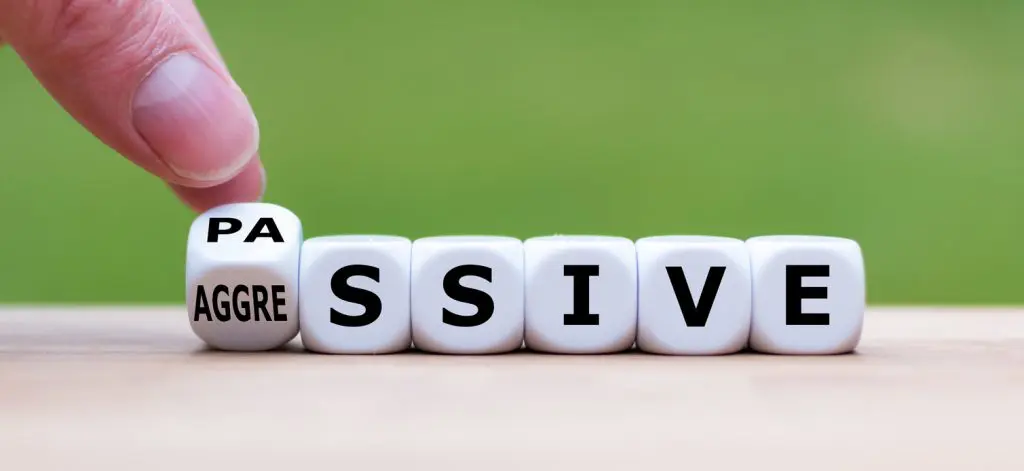What is Passive-Aggressive behavior?
Many people are familiar with this term and have experienced it but few people can recognize all the different behaviors and how to deal with them. Passive-aggressive behavior refers to a pattern of expressing negative feelings indirectly rather than openly addressing them. This behavior is a common phenomenon that can cause significant problems in relationships, both personal and professional. Dealing with a passive-aggressive person can be challenging because they are cleverly hiding their real feelings. This blog article will help you recognize the behavior and take action to minimize the effect on you.

Can Passive-Aggressive Behavior be Disorienting?
Yes, passive-aggressive behavior can be disorienting because it can be difficult to understand the intentions and emotions of the person exhibiting this behavior. Passive-aggressive behavior often involves indirect and subtle communication, which can leave others feeling confused and uncertain about what is really going on. The behavior can also create a sense of tension and anxiety, as people may feel like they are walking on eggshells around the passive-aggressive person, trying to avoid triggering their negative reactions. Over time, this can lead to a breakdown in trust and communication, which can have a negative impact on relationships.
It’s essential to approach the situation with empathy while still being direct. Many individuals adopt passive-aggressive behaviors due to past experiences, fears, or learned patterns of dealing with conflict. Being patient and understanding can go a long way in resolving these issues.
How to tell if you are dealing with a passive-aggressive person?
Identifying passive-aggressive behavior can be challenging, as it is often subtle and indirect. However, there are several signs that can help you recognize this behavior:
- Avoiding direct communication
Passive-aggressive individuals often avoid direct communication, as they fear confrontation or believe that their feelings will not be validated. They may use ambiguous language, give the silent treatment, or withhold information to express their displeasure. - Sarcasm and backhanded compliments
Passive-aggressive individuals may use sarcasm and backhanded compliments to express their negative feelings. For example, they may say, “Wow, you look great today, did you lose weight?” or “I’m impressed you managed to finish that task, even though it’s not perfect.” - Procrastination and delaying
Passive-aggressive individuals may procrastinate or delay tasks as a way of expressing their resentment or frustration. They may agree to a task but not complete it or delay it until the last minute, causing stress and frustration for others. - Claims they are Misunderstood
Passive-aggressive people may claim that they are misunderstood because their behavior is often indirect and subtle, which can be difficult for others to interpret. Passive-aggressive individuals may feel like they are expressing their emotions in a way that is clear to them, but they may not realize that others are struggling to understand their true intentions. They may also feel like their feelings are not being acknowledged or validated, which can lead to further resentment and frustration. - Distancing or Silent treatment
Passive-aggressive individuals may use the silent treatment as a way of expressing their displeasure or punishing others. They may refuse to engage in conversation or respond to messages, leaving others feeling confused and frustrated. They will distance themselves without explaining why and attempts to fix your relationship will be met with denial and deflection. - Indirect criticism
Passive-aggressive individuals may express their criticism indirectly, using vague language or subtle hints. They may criticize others in a way that appears to be constructive feedback, but with the underlying intention of causing harm or expressing their negative feelings. - Sulking and Pouting
Sulking or pouting can be a way for a passive-aggressive person to avoid taking responsibility for their actions or to manipulate others into giving them what they want. They may use this behavior as a form of emotional blackmail, hoping to make others feel guilty and give in to their demands. - Intentional Sabotage
Passive-aggressive individuals may engage in sabotage as a way of expressing their anger or frustration indirectly. Sabotage can take many forms, such as intentionally delaying tasks, withholding important information, or creating obstacles that hinder the progress of a project or relationship. Passive-aggressive individuals may not realize the full impact of their actions, as they may feel like they are expressing their feelings in a subtle way that does not cause direct harm. However, the consequences of sabotage can be significant, as it can lead to a breakdown in trust and communication, and cause significant problems in personal and professional relationships
How to handle a passive-aggressive person?
Dealing with a passive-aggressive person can be challenging, but there are several strategies that can help you manage this behavior:
- Address the behavior directly: If you suspect that someone is being passive-aggressive, try to address the behavior directly. Acknowledge their feelings and express your own in a non-judgmental way, but be firm in your communication.
- Encourage open communication: Encourage the passive-aggressive individual to express their feelings directly and openly. Let them know that their feelings are valid and that you are willing to listen and work towards a solution together. Whenever the individual communicates openly or behaves in a direct, positive manner, reinforce and appreciate their actions.
- Awareness: If you know the signs, you can start to recognize that cycle of behavior in your friends and family members. They might not be aware of what they are doing or they might not be capable of acting more directly. However, if you know what is going on, you can encourage them to be more direct. You’ll also find that the disorienting effects of passive aggression will be minimized.
- Seek outside help: If the passive-aggressive behavior is causing significant problems in your personal or professional relationships, seek outside help from a counselor or therapist.
- Set boundaries: Setting boundaries with a passive-aggressive person can be challenging, but it is an important step in addressing their behavior and maintaining healthy relationships. When setting boundaries with a passive-aggressive person, it is important to be clear and specific about what behaviors you will and will not tolerate. For example, you may say “I will not tolerate passive-aggressive comments or behavior directed towards me.”
- Follow through on consequences: It is important to follow through on the consequences of violating boundaries, to demonstrate that you are serious about maintaining them. For example, if the person continues to engage in passive-aggressive behavior despite your request not to, you may need to limit your interactions with them or end the relationship altogether.
- Seek Support or Mediation: It can be helpful to seek support from friends, family, or a therapist, to help you maintain your boundaries and navigate difficult conversations with the passive-aggressive person
Help in the Denver Area
Passive-aggressive behavior can be frustrating and challenging to deal with. However, by identifying the signs of this behavior and using effective communication and boundary-setting strategies, you can manage this behavior and improve your relationships. We’re here to help you deal with Passive-Aggression in the Denver Area. We invite you to call us at 720-551-4553 for a free 20-minute phone consultation with a therapy specialist. Click here learn more about our Therapy Services
Self Care Impact Counseling envisions a new age of counseling for adolescents, adults, couples & groups that makes a REAL difference with core values of GROWTH | BALANCE | COMPASSION | INNER HARMONY.

